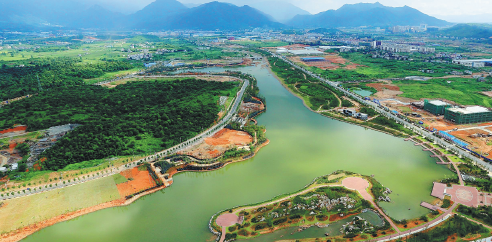
A view of Miluo city which is the home of the Dragon Boat Festival and a base for dragon boats in Hunan province. (Photo: China Daily)
City in central Hunan province commemorates life of ancient Chinese poet Qu Yuan with Dragon Boat Festival.
Miluo has a special place in Dragon Boat Festival celebrations. The city in central Hunan province is where the ancient Chinese poet Qu Yuan (340-278 BC) ended his life.
The Dragon Boat Festival commemorates the great poet's life, and Miluo is considered the home of the festival and base of dragon boats.
As the city is an important part of the festival it was put on the UNESCO world cultural heritage list in 2009.
Miluo has a whole set of customs for the festival, including eating zongzi (pyramid-shaped dumpling made of glutinous rice and reed leaves), drinking realgar (xionghuang) wine, dragon-boat racing and dragon-head sculpting.
And one can also take part in events along the Miluo River, where Qu drowned himself.
For the festival, the Quzi (also known as Quyuan) memorial temple hosts a grand celebration, which traces its roots back to 278 BC.
The temple sits atop Yusi Mountain in northwest Miluo, and Qu Yuan lived there for a while during his exile.
The Quzi temple was first built in the Han Dynasty (206 BC-AD 220), and was then moved to Yusi Mountain by Empeor Qianlong (1711-99) of the Qing Dynasty in 1756. It has become a key national cultural site since 2001.
The temple celebration comprises royal rituals from the Qing Dynasty (1644-1911), and ancient music and sacrificial items are showcased to give visitors a taste of what it was like in the past.
The celebration was put on the provincial intangible cultural heritage list by the Hunan government in 2009.
Separately, a pavilion, a cave and a bridge that are believed to bear Qu Yuan's footsteps are all within walking distance of the temple.
A forest with more than 350 calligraphy and painting tablets in honor of Quyuan takes up an area of 16,000 square meters to the east of the temple.
Besides the Quzi Memorial Temple, the former residence of Ren Bishi (a Communist Party leader), national wetland parks and the Xinshi ancient town are all worth visiting.
And while immersing themselves in various traditional activities for the Dragon Boat Festival, visitors can also enjoy the local scenery.
Miluo's dragon boat competition is a must-see. And last year, the mass drum-beating event, the poetry recital and a song-and-dance show featuring historical elements were added among all the attractions along the Miluo River bank.
This year, a large-scale modern music opera Qu Yuan is to be launched for the festival. The show explores innovation, integration of Chinese history and stage art and showcases the poetic and romantic elements of Li Sao (The Sorrow of Parting), one of the most influential of Qu Yuan's works.
The show hopes to showcase Qu's ideas and state of mind leading up to his suicide in multiple dimensions during the show, which is jointly developed by top Chinese art institutes, including the Central Academy of Drama, the Beijing Film Academy and the Beijing Institute Of Fashion Technology.
The show which premiered at Beijing's Century Theater over May 31-June 2, will be staged in Miluo during the festival.
For those who seek more varied experiences, the traditional towns and villages in Miluo may be of interest.
In 2016, the local government spent 5 billion yuan ($724.6 million) to develop a 20-km tourism corridor, which connects several idyllic towns featuring wetlands, old tombs and folk culture.
So, one can walk on old stone streets and sip sweet wine at Changle town; tour a botanical garden, visit a culture park and ancient business blocks at China poetry town or experience ancient architecture at Xinshi ancient town.
The area is ideal for those who want to leave behind a city life for a while and recharge their batteries.


